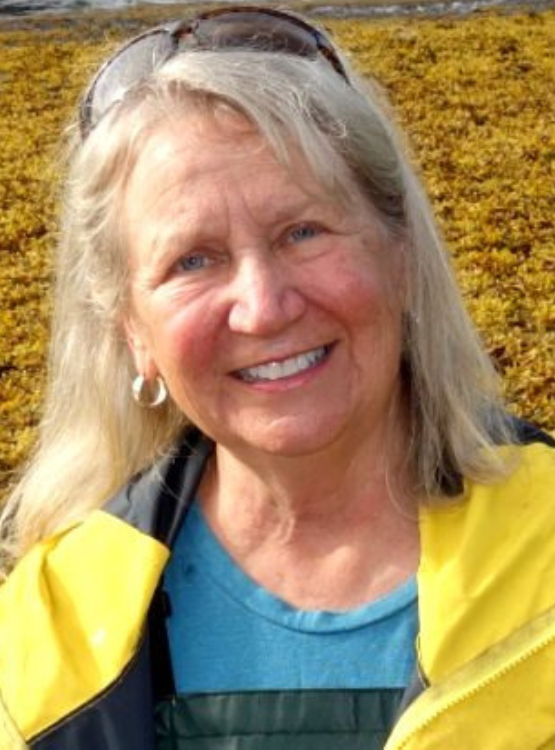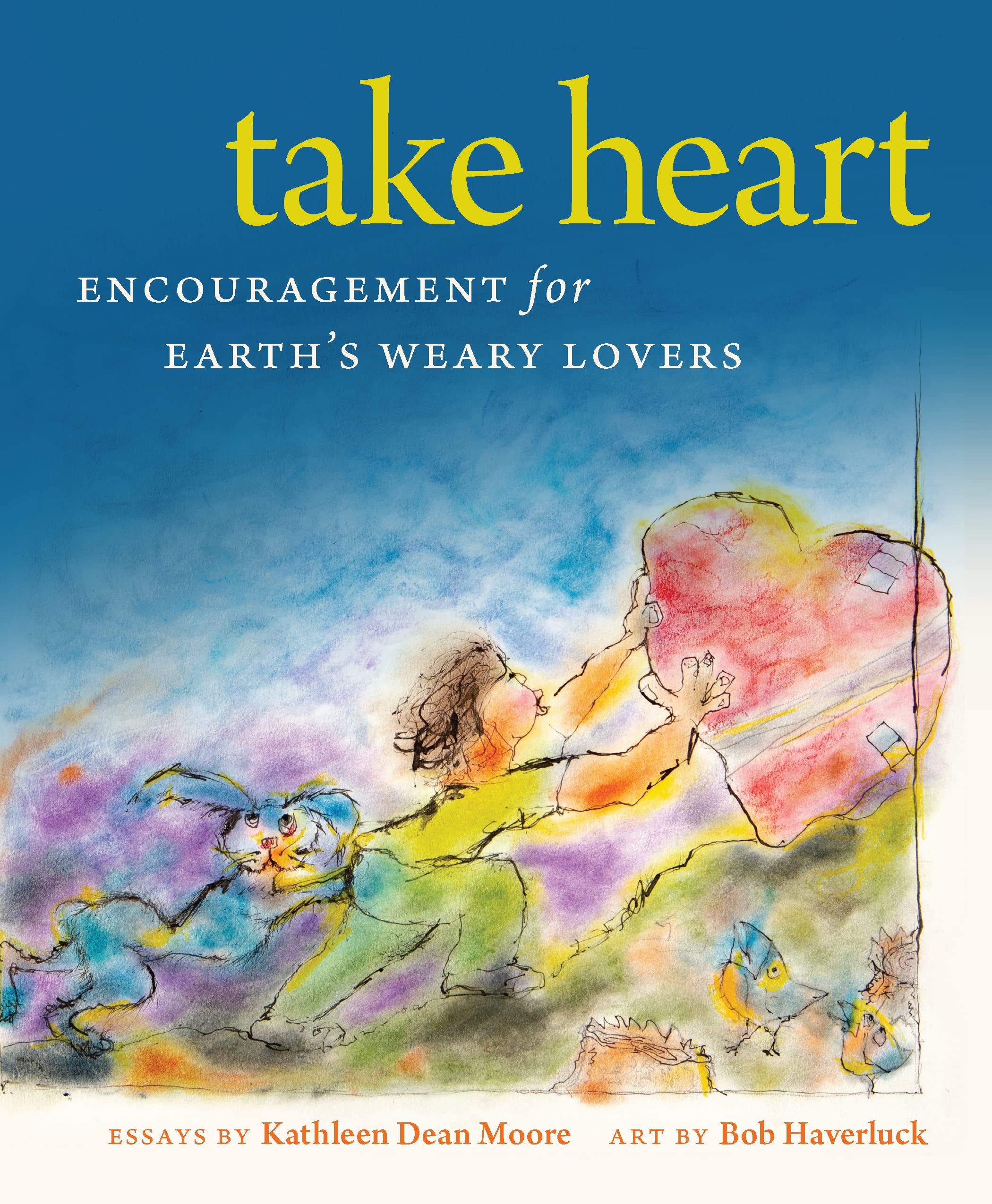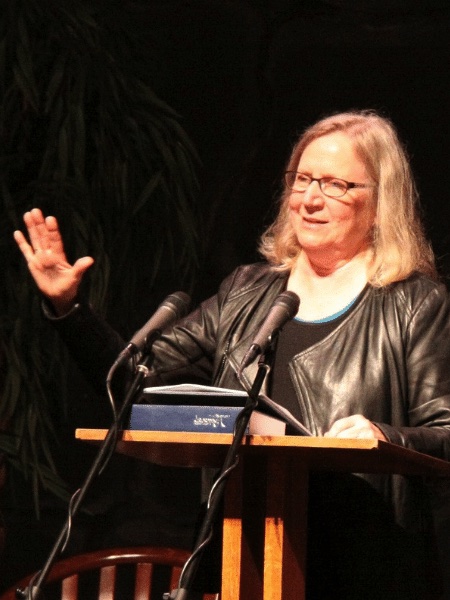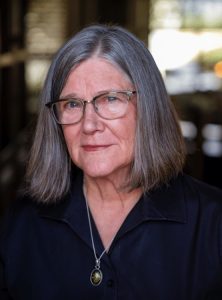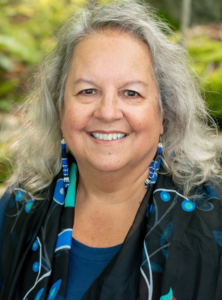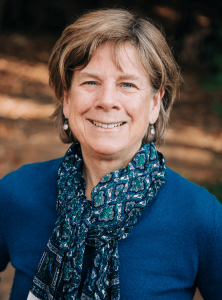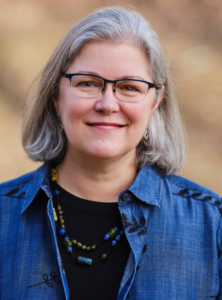Kathleen Dean Moore is a writer, moral philosopher, and environmental thought-leader, devoted to the defense of the lovely, reeling world.
As a writer, Moore first came to public attention with award-winning books of essays that celebrate and explore the wet, wild world of rivers, islands, and tidal shores – Riverwalking, Holdfast, Pine Island Paradox, and Wild Comfort. But her growing alarm at the devastation of the natural world called her to respond directly to the moral urgency of climate action. With that decision, Moore quit her university position. She began to write and speak out about our responsibility to protect a thriving future from corporate pillage and imminent climate chaos.
Her first climate ethics book, Moral Ground: Ethical Action for a Planet in Peril (co-edited with Michael P. Nelson, foreword by Desmond Tutu) gathered testimony from the world’s moral leaders about humanity’s obligation to the future. A special tenth-anniversary issue of that book will be released in 2020. In 2016, Moore published Great Tide Rising: Finding Clarity and Moral Courage in a Time of Planetary Change, and a novel, Piano Tide, that Bill McKibben described as “savagely funny and deeply insightful.”
Moore has finished three new books that are in line to be published over the next few years. They are Witness: The Human-Rights Impacts of Fracking and Climate Change (co-edited with Tom Kerns), a report on the recent trial of fracking before an international human rights court; Heartening: Encouragement for Earth’s Weary Lovers, a chapbook that pairs short essays with drawings by Canadian artist Bob Haverluck; and The Terrible Silence of the Sky, a book of Moore’s essays that celebrate birdsong and mourn its passing.
Moore’s essays are widely published and anthologized, having appeared in magazines such as High Country News, Orion, Discover, Audubon, Utne Reader, Earth Island Journal, New York Times Magazine, Conservation Biology, and many others. Her writing is honored by awards that include the Willa Cather Award for Contemporary Fiction, the Oregon Book Award, a Choice magazine Outstanding Book Award, the Pacific Northwest Book Association Book Award, and the Sigurd Olson Nature Writing Award. Moore was granted an honorary Doctorate in Humane Letters from the SUNY College of Environmental Science and Forestry, and appointed an Honorary Member of the Association for the Study of Literature and the Environment.
A moral philosopher, Kathleen holds a Ph.D. from the University of Colorado. For many years, she taught critical thinking and environmental ethics as Distinguished Professor of Philosophy at Oregon State University. She has published philosophical books on forgiveness (Pardons: Justice, Mercy, and the Public Interest), Apache philosophy (How It Is: the Native American Philosophy of Viola Cordova), Rachel Carson (Rachel Carson: Legacy and Challenge), and critical thinking (Reasoning and Writing). Currently, she is a member of the Council for an Uncertain Human Future, Clark College, Massachusetts.
Moore has a special interest in the role of the arts in environmental action. While at OSU, she co-founded and for many years directed the Spring Creek Project for Ideas, Nature, and the Written Word, where she now serves as Senior Fellow. She co-founded the Long-term Ecological Reflections program at the H.J. Andrews Experimental Forest, a program intended to gather literary responses to the forest for two hundred years. She is currently touring a musical performance about species extinction, “The Extinction Variations,” in which she weaves her words into a Rachmaninoff composition performed by concert pianist Rachelle McCabe.
Moore is a “public philosopher” who speaks widely and offers workshops about the moral obligation to stop fossil fuels and the climate chaos they are causing. She has addressed audiences ranging from 350.org activists to Nobel Conference scholars to Disneyworld executives and students all over the country, calling people to moral courage as they confront the forces that would wreck the world.
Moore is joyously embedded in a family of environmentalists and biologists. Her parents were science educators who led nature walks in the beech-maple forests in Ohio. Her husband, Frank, a neurobiologist, is an expert on amphibian behavior. Their daughter, Erin, is the Head of the School of Architecture and Environment at the University of Oregon; and their son, Jonathan, holds the Liber Ero Chair in Coastal Studies and Management at Simon Fraser University in British Columbia. Between them, they have given Moore three grandchildren who are wildly in love with the world. Kathleen and her husband live in Corvallis, Oregon, but spend summers in a cabin where two creeks and a bear trail meet a tidal cove in Alaska’s maritime wilderness.
For Environmental Topics, check out Kathleen’s profile at Authors Outside!
